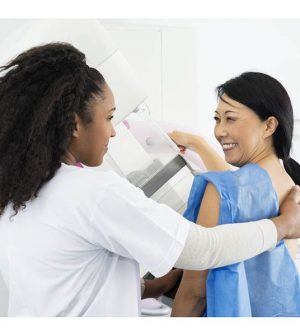- Recognizing the Signs of Hypothyroidism
- 10 Strategies to Overcome Insomnia
- Could Artificial Sweeteners Be Aging the Brain Faster?
- Techniques for Soothing Your Nervous System
- Does the Water in Your House Smell Funny? Here’s Why
- Can a Daily Dose of Apple Cider Vinegar Actually Aid Weight Loss?
- 6 Health Beverages That Can Actually Spike Your Blood Sugar
- Treatment Options for Social Anxiety Disorder
- Understanding the Connection Between Anxiety and Depression
- How Daily Prunes Can Influence Cholesterol and Inflammation
U.S. Cancer Screening Rates Back to Normal After Pandemic Dip

After a sharp drop early in the COVID-19 pandemic, rates of routine breast and colon cancer screening soon returned to near-normal levels, a new study finds.
“These are the first findings to show that, despite real fears about the consequences of drop-off in cancer screens, health facilities figured out how to pick this back up after the initial pandemic restrictions,” said lead study author Ryan McBain. He’s a policy researcher at RAND Corporation, a nonprofit research organization.
For the study, researchers analyzed insurance claims from 6.8 million U.S. adults (aged 45 to 64) filed between mid-January and July 31 of last year.
After March 13, 2020, when a national pandemic emergency was declared, the median weekly rate of routine screening mammograms plummeted 96%, from 87.8 per 10,000 beneficiaries to 6.9 per 10,000 in April. (Median means half of weeks had more, half less.)
By the end of July, however, the rate had bounced back to 88.2 per 10,000.
Meanwhile, routine colonoscopy screening rates had a similar decline, falling 95% from 15.1 to 0.9 per 10,000. While the rate rebounded to 12.6 per 10,000 by the end of July, it wasn’t enough to offset the initial plunge, according to findings published online March 19 in the Journal of General Internal Medicine.
“Our study shows that health systems were able to recalibrate resources and protocols in a relatively short interval to deliver these important services,” McBain said in a RAND news release.
Routine screening procedures such as mammography and colonoscopy are essential for early detection and treatment of cancers, the study authors noted.
When routine screenings plummeted, there were concerns that cancer diagnoses would be delayed, resulting in serious health consequences. Now that rates have rebounded, those who postponed screening should get priority, one researcher suggested.
“While it is reassuring to see cancer screening rates begin to return to pre-pandemic levels, we have to ensure that people who deferred preventive services are prioritized to get their screening in a timely manner, especially if they are at higher risk of disease,” said study co-author Dr. Dena Bravata, chief medical officer of Castlight Health, a San Francisco-based company focused on access to care.
More information
The U.S. National Cancer Institute has more on cancer screening.
SOURCE: RAND Corporation, news release, March 22, 2021
Source: HealthDay
Copyright © 2026 HealthDay. All rights reserved.










